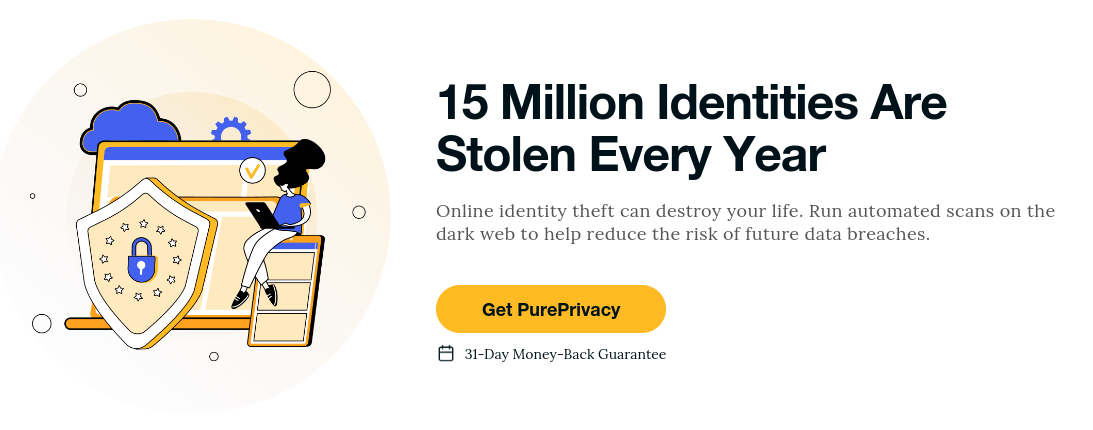Table of Content
Back in 2023, CDW, a major IT solutions provider, revealed a significant data leak and demanded a multimillion dollar ransom.
And the ransomware gang threatened to leak private data if the company didn’t pay $80 million.
Sadly, the cybercriminals leaked the data because their demands were not met.
What does this mean for tech companies and platforms with millions of user data?
Find out everything in this blog about the impact of this data breach and how you can stay protected in such cases.
Discover if Your Most Critical Identifiers Have Been Exposed on the Dark Web
Receive timely alerts and actionable insights with PurePrivacy's Dark Web Monitoring.
What Happened in the CDW Data Leak?
In 2023, CDW, a major company that provides technology solutions, was hit by a ransomware attack from a group called LockBit.
The attackers stole a large amount of sensitive data and demanded money from CDW, threatening to release the stolen data if they didn’t pay. CDW decided not to pay the ransom, so the attackers released some of the data online.
This incident likely caused CDW to lose money and hurt its reputation. Customers whose information was leaked might be at risk of identity theft or financial fraud. However, the exact details of what was leaked and how much damage was done are not fully known.

What Was the Impact of This Data Breach on CDW Users?
The CDW data leak had a big impact on users. Personal details like names and email addresses were exposed, increasing the risk of identity theft and fraud. This made users worry about their privacy and how their information might be misused.
Additionally, the breach damaged trust in CDW's ability to protect user data. Affected users may need to keep a close eye on their bank accounts and credit reports for any unusual activity. How CDW handles the situation will be important for rebuilding trust.
Millions of CDW Users Were Targeted in This Data Leak
CDW has estimated that the personal information of a significant number of users was exposed in this data leak. The company has been transparent about the breach, issuing a statement:
"While we regret this incident, we want to assure our customers that no highly sensitive information, such as credit card numbers or social security numbers, was compromised. However, we recommend that users take precautions to protect their accounts."
Despite these assurances, the data that was leaked can still be used for malicious purposes, particularly in phishing attacks.
What Are the Potential Privacy Risks from Exposed Data?
The data leaked in the CDW incident can lead to several privacy risks, including:
Unwanted Contact and Scams
Cybercriminals can use the exposed email addresses to send spam or phishing messages.
Identity Theft
Leaked personal details could be used to impersonate users or create fake accounts.
Targeted Attacks
The information could be used by hackers to launch targeted attacks on businesses or individuals.
To reduce these risks, affected individuals should monitor their accounts closely, update passwords, and consider using identity theft protection services.

How to Take Immediate Action in Case of a Data Leak
If you’ve been affected by the CDW data leak, it’s important to take immediate steps to secure your information:
| Change Your Passwords | Update passwords for all online accounts, especially those linked to the compromised email address. |
| Monitor Your Accounts | Regularly check your financial accounts for any unauthorized transactions or suspicious activity. |
| Enable Two-Factor Authentication | Strengthen the security of your online accounts by enabling two-factor authentication. |
| Be Vigilant for Phishing Scams | Be cautious of any emails or texts that appear suspicious, especially those claiming to be from CDW. |
Even though you are well aware of these security precautions, hackers are smarter and more cunning with their practices.
They will try every trick in the book to steal your data to ask for a ransom or sell private information online to interested parties.
You can consider using a privacy-focused app like PurePrivacy that can defend your data against such online breaches and threats.
Protect Your Sensitive Information Against Hackers and Scammers
PurePrivacy is a privacy app designed to enhance online privacy by blocking trackers and protecting your data from breaches like the CDW data leak:
- Keep an eye on the dark web for your personal information with Dark Web Monitoring.
- Enable the Tracker Blocker to stop online tracking and data collection.
- Use the Remove My Data tool to automatically request data opt-outs.
- Boost your privacy on key social media platforms with the Social Privacy Manager.

Monitor the Dark Web for Compromised Information
You can keep track of dark web breaches and receive alert notifications whenever someone posts your information on the dark web.
Block Unwanted Trackers and Prevent Data Collection
You can stop websites and third-party trackers from gathering and selling your browsing data to advertisers or other entities.
Send Automate Opt-Out Requests to 200+ Data Brokers
You can review and assess data brokers who collect your information and send automated requests to remove your data from their systems.
Enhance your Social Media Privacy
You can use PurePrivacy to evaluate and enhance your privacy settings on social media platforms, ensuring your personal information is protected across all channels.
Frequently Asked Questions (FAQs)
-
Was there a recent data breach at the University of Wisconsin?

Yes, in 2024, the University of Wisconsin experienced a data breach that exposed the personal information of students, faculty, and staff.n
-
What should I do if my information is compromised?

Change your passwords, monitor your financial accounts, enable MFA (multi-factor authentication), and be cautious of phishing attempts. You may also consider enrolling in credit monitoring services for added safety.n
-
What are the risks if my data is exposed?

The risks include identity theft, phishing attacks, and unwanted solicitation.n
In Summary
The University of Wisconsin data leak serves as a stark reminder of the importance of data privacy in educational institutions. By taking proactive measures, you can protect your personal information and reduce the risks associated with such breaches.
You can also consider using PurePrivacy with a VPN to receive dark web alerts, send information removal requests, enhance social media privacy settings, and block intrusive trackers online.





